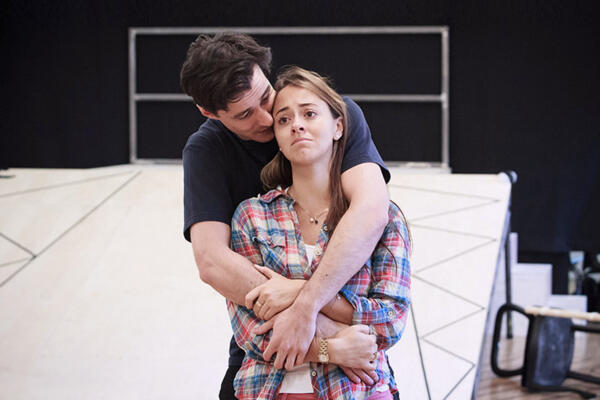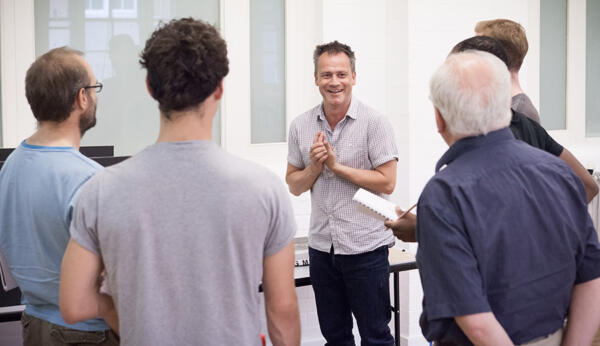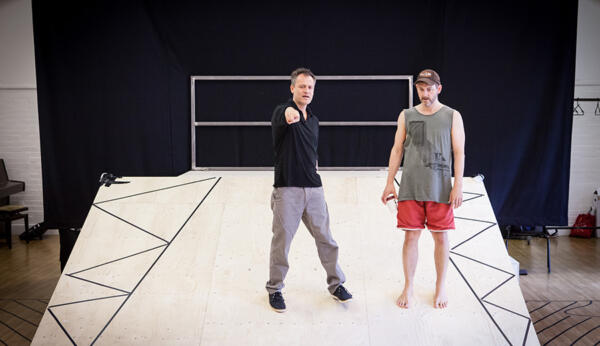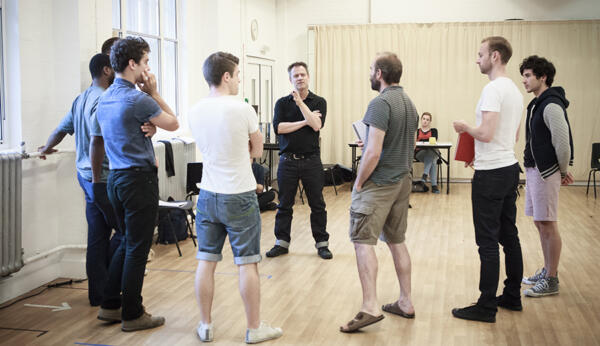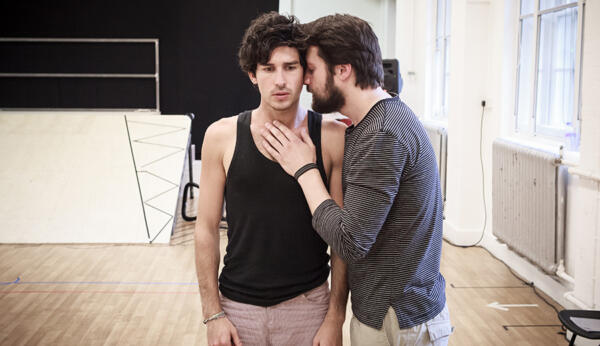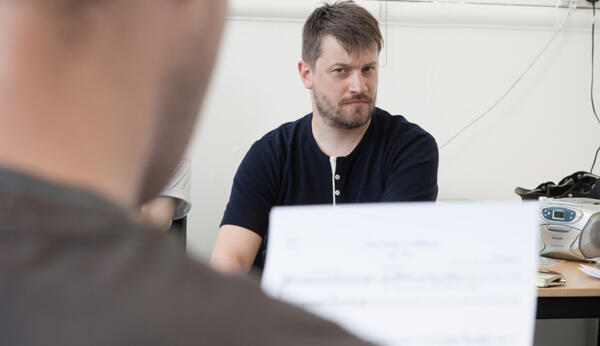A Midsummer Night's Dream | Inside the Rehearsal Room
A Midsummer Night's Dream– Week Three, Day Five
The day’s work starts with Michael and Company Stage Manager Sophie Gabszewicz discussing the cast’s call‑times on Monday, while DSM Lorna Earl repairs the mark‑up on the rehearsal room floor.
The actors begin to arrive, ready to rehearse part of Scene Three – an exchange between Oberon and Puck, played by Padraic Delaney and Gavin Fowler, during which the magic flower is introduced. Michael calls everyone to order: ‘Thank you… Let’s go back on all of that. Let’s look at the overview, of the intention of this stuff.’
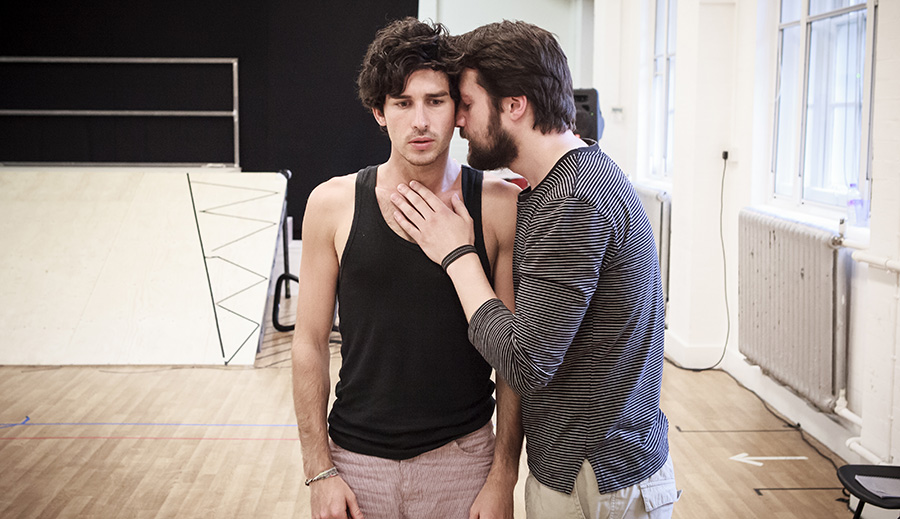
They run the scene, with Michael making observations and asking questions. He counsels Padraic against making his performance too big early on: ‘Think of it like a piece of music – the composer reaches a crescendo, but then there’s a quieter passage where we can reconfigure and gather ourselves.’ He describes the earlier part of Oberon and Puck’s exchange as a ‘firework scene’, but this moment is more contemplative. ‘This is the beginning of the plan,’ says Padraic. Michael agrees, encouraging the actors to keep engaging with one another – ‘Keep that tension there, Gavin. You’ve got to keep a giant question mark over the whole scene.’
He works with Padraic and Gavin to find all the colours within the scene. ‘What you can introduce there, if I may say, is a little bit of mischief,’ Michael suggests at one point. All the while, he maintains the focus on delivery and engagement, giving the actors various notes: ‘Can you try taking out even the cigarette paper from between those lines… Keep it alive, keep talking to him… You’re still going off on one for yourself – I want you to enjoy it with him.’
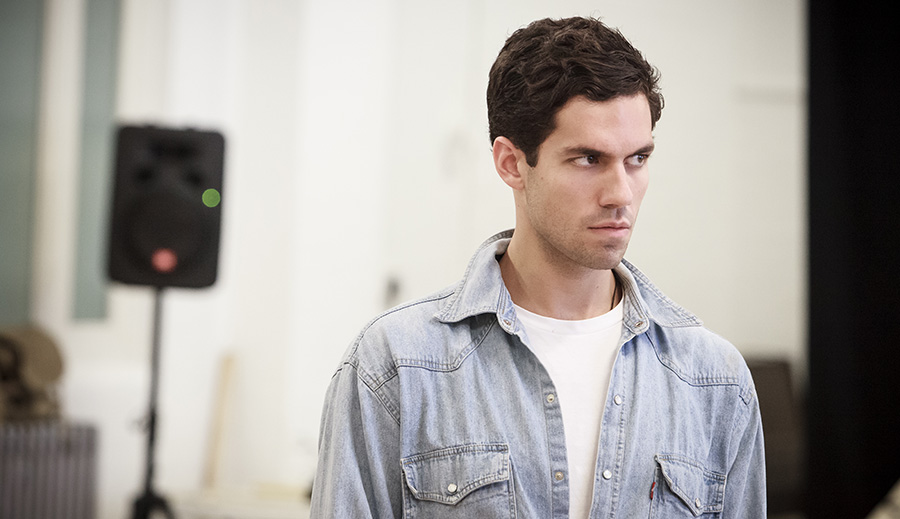
Michael then turns his attention to the Lovers in the woods, in particular their exchanges in scenes three, four and six. ‘Some things we should look at before they bed in too far,’ he says. Working with Katherine Kingsley and Stefano Braschi, who play Helena and Demetrius, Michael focuses on their first scene together, with Helena in pursuit of her former fiance. He wants to ‘lessen the intensity’, asking the actors to ‘tell us the story’ instead. ‘What is your attitude towards Helena’s “modesty”, her virginity?’ Michael asks Stefano as Demetrius. ‘It’s not clear.’ They discuss it before running the scene again. ‘That’s a good choice,’ says Michael afterwards. ‘Can you heighten that? Appealing to her, not being too aggressive. Up that choice.’
Katherine’s concerned the exchange became too fraught – ‘Does it need more stillness?’ Michael understands her point: ‘It got too “Ibsen” – too tragic in the wrong way. The key to all of it is don’t lose her charm.’ He helps both actors ground themselves in the fundamentals: ‘The “uber-motive” of this scene is for Helena to catch Demetrius and for Demetrius to escape. Make sure no move or thought is bigger than the need to communicate with one another.’
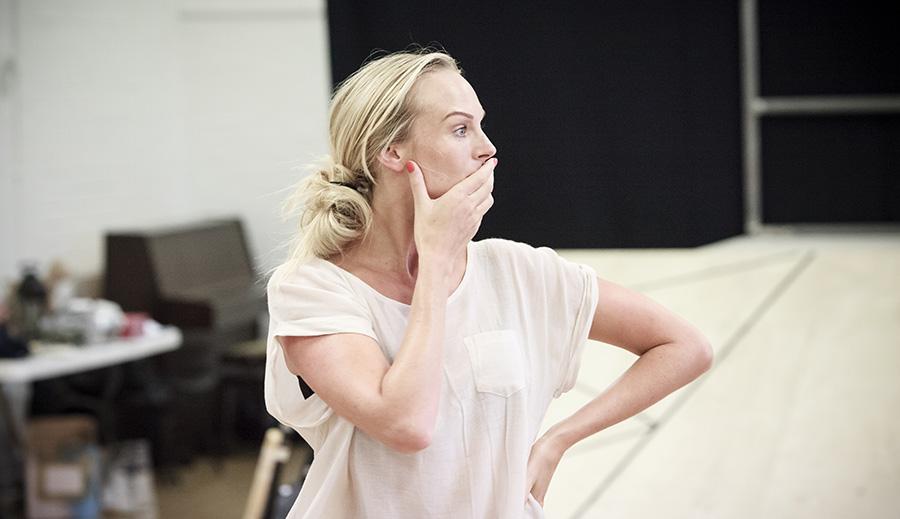
Michael consults his script and notes. ‘There was a bit of air that got in between some lines. We just need to tighten it – join up the lines and thoughts.’ He also considers tone and emphasis, suggesting to one actor, ‘There’s a line you could give a little more colour to’. Returning to Katherine’s earlier point about stillness, Michael comments, ‘Have the courage to stay there on, “We cannot fight for love, as men may do” – let us come to you’. He works with the cast to continually explore the possible alternatives – ‘Is there a version where…?’ – and they’ll consider another option. The welfare of the actors is uppermost in Michael’s mind and he asks if the blocking of Helena and Demetrius’ tussle within the scene feels safe – ‘Or do I need to bring someone in?’
He finishes work on Scene Three by looking at Oberon and Puck’s final exchange, maintaining his focus on the text: ‘You’re being ever so slightly over emphatic with your delivery there – balance it out a bit more.’ This includes considering the punctuation within one of Oberon’s lines and there follows a brief discussion about changing it to clarify the meaning – from: ‘Hast thou the flower there? Welcome, wanderer.’ To: ‘Hast thou the flower there, welcome wanderer?’ The second version is chosen for the time being. ‘Hold onto that,’ says Michael.
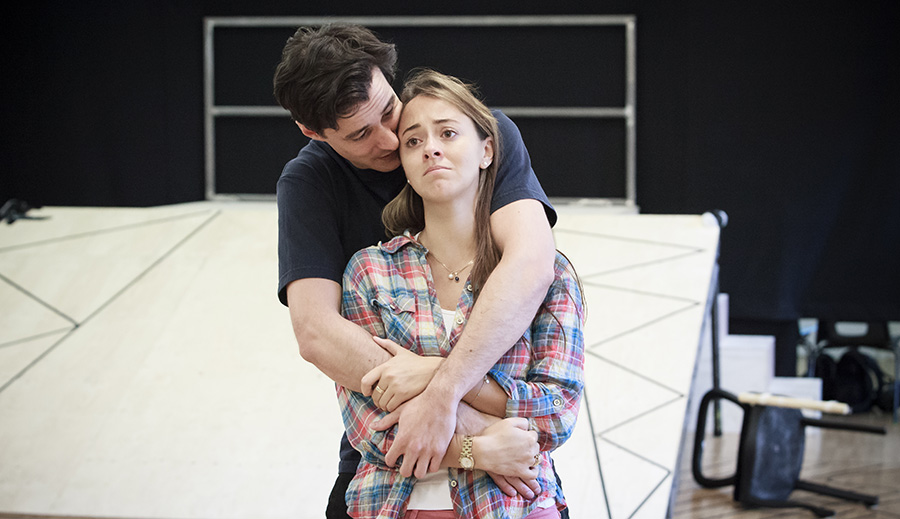
Staying with the Lovers in the woods, he moves onto Scene Four and an exchange between Hermia and Lysander, played by Susannah Fielding and Sam Swainsbury. They run the scene once, following which Michael observes to Sam, ‘What’s consistent is you’re always pulling away from “Fair love” in “Fair love, you faint with wand’ring in the wood”. He makes the general point that an actor inserting an ‘oh’ or ‘ah’ into Shakespeare tells him that they’re not comfortable with a line – it’s an actor’s trick to try and get into it. ‘You don’t need them,’ says Michael, encouraging the cast to trust the verse.
There’s a lot of humour in the room, the team supporting one another through their banter. The scene’s run again, Sam joking beforehand, ‘I’ll mess it up now!’ Michael reassures him and the other actors: ‘You’re allowed to. That’s why we’re in here.’
The work on Scene Four concludes with Puck mistakenly casting a spell on Lysander, who then falls in love with Helena. ‘I’d love to see slightly more clearly when you decide to do it,’ Michael says to Gavin, referring to the moment when Puck drops the potion in Lysander’s eyes. He encourages him to maintain the vitality of the text before his exit: ‘Don’t end with a full-stop – keep it alive.’
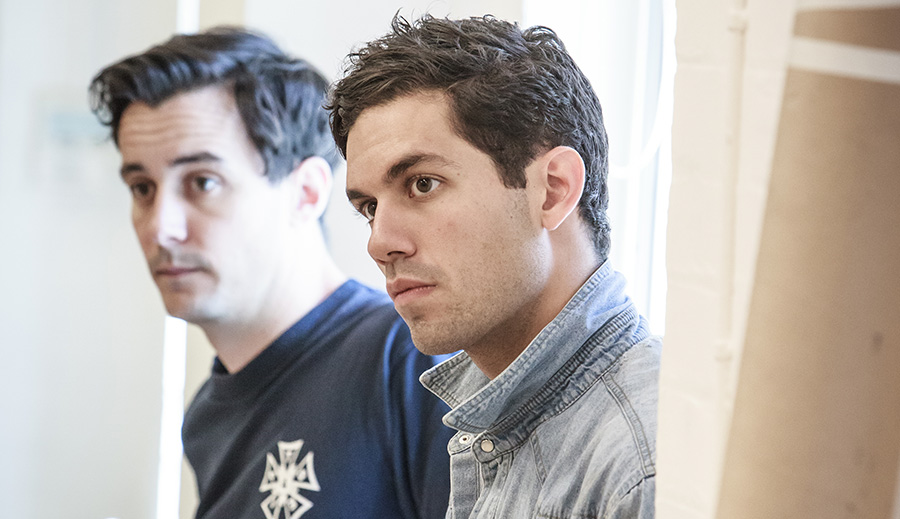
Michael switches his focus to Demetrius, Helena and Lysander, wanting to preserve the energy of the scene toward its climax. ‘It just needs something a little bit more…’ he comments to Stefano, before concluding, ‘I guess you just need to play the exit.’ Turning to Katherine, he considers Helena’s closing speech: ‘Make sure the front end is balanced and the rest of it should look after itself.’
Work then begins on Scene Six, a long scene featuring all four Lovers, plus Oberon and Puck. It opens with an exchange between the Fairy King and his mischievous jester, whose speech recounts Titania’s falling in love with a donkey: ‘So it came to pass, / Titania wak’d, and straightway loved an ass.’ Michael comments on this last line – ‘In musical terms, it’s “the button”. He likes Gavin’s interpretation. ‘Hold onto it. It’s a brilliant choice that.’
This is followed by Hermia’s entrance, pursued and harassed by Demetrius. ‘We need to join you in high dudgeon,’ says Michael. They run the scene, following which he comments, ‘I don’t know why but it’s not quite working for me’. Michael, Susannah and Stefano discuss elements within the scene, such as the near-embrace between Hermia and Demetrius as she attempts to woo information from him. ‘It needs to be something that fills the moment more convincingly,’ suggests Michael. He focuses on particular moments, reminding the actors of their motives: ‘I’m not sure what the attitude is there. Join those thoughts up, be specific.’ They run the scene again and Michael thinks it better, commenting to Stefano, ‘It might have been a little slower in its rhythm, but it didn’t let in any air and you kept it alive’.
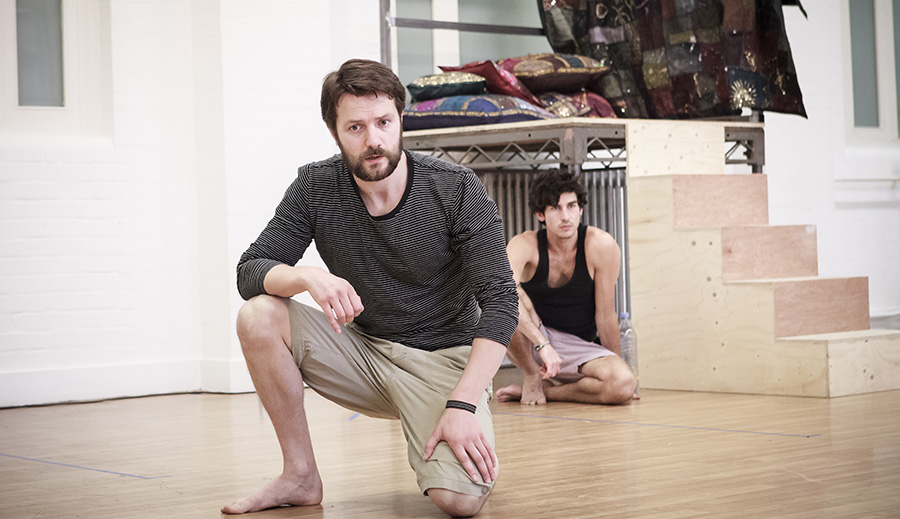
The focus of the scene shifts back to Oberon and Puck as they look on. ‘Just go a little lighter there,’ Michael advises Padraic in his exchange with Gavin, ‘keep it with him.’ He reflects on Gavin’s delivery of, ‘Shall we their fond pageant see? / Lord, what fools these mortals be!’ – ‘Our choice to see them and then respond with the line is holding us up a bit. Can you have the thought on the line?’ In terms of the storytelling, Michael considers the intention of every piece of text: ‘Now, who’s that line for? (Oberon: Stand aside. The noise they make / Will cause Demetrius to awake.) All the people out there in the dark?’ Of Oberon and Puck’s exchange, he concludes – ‘The whole thing should be one complete charm.’
Katherine and Sam run the next part of the scene, between Helena and Lysander, Michael congratulating them afterwards – ‘I completely got the story.’ It’s decided that the waking Demetrius will pull focus with a long ‘Ohhh…’ on his opening line, ‘O Helen, goddess, nymph, perfect, divine!’ Michael counsels Stefano to exercise his judgement here: ‘Don’t overcomplicate it, otherwise you won’t let us in on the joke.’
Having worked on all the exchanges within this long scene, the cast attempt to join them together by running the whole thing. Michael reflects on it afterwards, particularly the tussles and fights: ‘The physicality was good. Was there anything that went wrong? Was there anything dangerous?’ He then focuses on the latter part of the scene, ‘unpicking’ it.
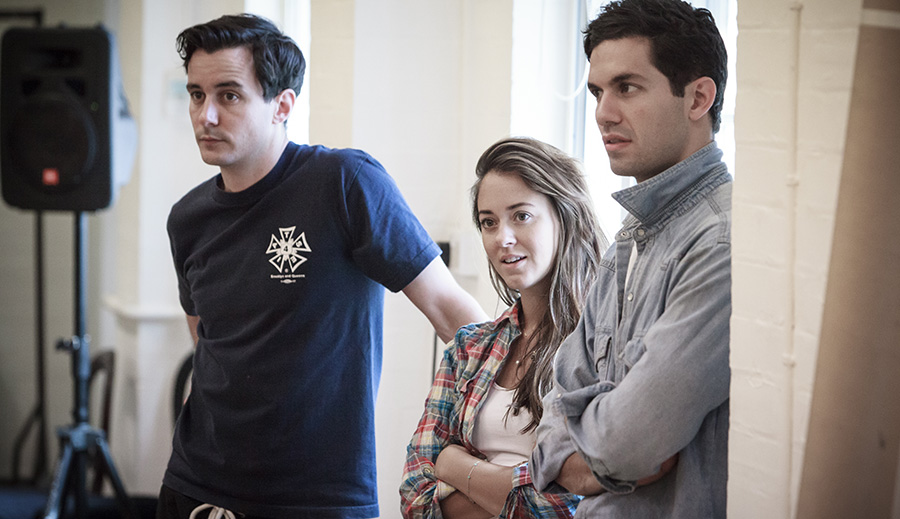
Michael reminds the actors of the purpose of today’s work, to reconsider the ‘intention’ of everything so far. ‘Be wary of choices made in week one. Don’t let them get in the way of your journey. As we get better, week one choices can hinder our new speed of thought.’ He warns the cast against this, particularly in certain instances: ‘Sometimes the choice is governing the line.’
Michael encourages the actors to make new discoveries, however small – ‘A tiny colour, a grace note.’ He invites them to join him in continuing to explore the text: ‘I’m for a week of abandoning choices so that perhaps we can find them again.’ This is a process, he says, that should continue into the run – ‘Taking out a choice for three performances to freshen it up, keep it alive.’ This is a general note to the whole cast: ‘Somewhere on stage you’ve got to keep it fresh. You have to keep listening to one another and talking to each other.’
Nearing the end of the session, Michael asks the actors whether they’d like to run the scene again, given its length and physical demands. How would they best like to use the time? They decide to work on the choreography of the various struggles, tussles and fights.
He focuses on another exchange between Oberon and Puck, returning to his earlier note about delivery and engagement, reminding the cast to talk to one another. ‘I was fine with that until you started giving it to the air again – I want you to give it to him,’ explains Michael to one actor. ‘Just tell him. Bring it down, don’t declaim. You’re telling him something you’ve already worked out. Take him through it, keep it simple.’ Another attempt finds this quality. ‘You trusted yourself to just say it,’ Michael responds, ‘and in doing so you picked out the key words naturally.’
